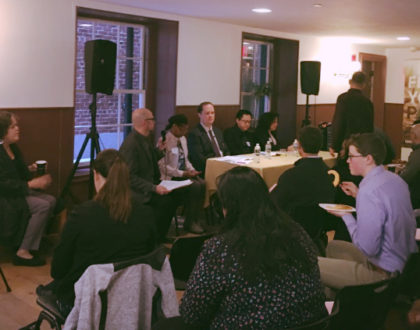On Racial Inequities, Policy Solutions

Hyams Foundation Report Panel Overview:
On April 12th, 2018, a group of diverse community leaders from across sectors in the city of Boston, gathered at the African Meeting House on Beacon Hill to discuss reflections on racial inequities and the policy pathways offered in the Hyams Foundation Report.
Jocelyn Sargent, Executive Director of the Hyams Foundation, shared opening remarks, inviting audience members to reflect on the history of racial equity initiatives that have echoed through the walls of the room we gathered in, at the African Meeting House, founded in 1806.
“I want you to know where you are,” she said. “This is the black community in the early 1800’s, tucked away in what is now Beacon Hill. We have the Black Heritage Trail, which starts across from the State House. You are in the middle of a very activist African American, and I’ll say, black community, because they built this meeting house before there was an America. There weren’t plantations in Boston, so people were scattered. They couldn’t congregate on the street, so they built this meeting house in 1806 and began a church, [that was later converted into] a school. You’re sitting in the classroom [of that school] right now.”
The panel discussion that unfolded, certainly aligned with the history of the community landmark we gathered in.
Discussion moderator and Hyams Foundation Fellow, Sergio Marin Luna introduced panelists Trina Jackson of Practice Leader for Community Engagement, Steve Koczela, President of MassINC Polling Group, Mark Liu, Operations and Development Director of the Chinese Progressive Association and Alexandra Oliver-Davila, Executive Director of Sociedad Latina.
The aim of the Hyams Foundation Report is to “shed light on the lives of those who are most often marginalized.” The report seeks to illuminate answers to question such as, What can we learn about racial inequalities that’s new? “We already know that economic prosperity has eluded many people of color. We know that there are challenges with housing and that decent quality housing seems to be just out of reach for marginalized people. We know that parents of color are struggling to ensure that their kids don’t suffer from these discriminatory laws, as well as being able to build a real and solid base for their future. We know by looking at countless reports that, black people don’t trust the criminal justice system. What we don’t know is, how does that show up in their lives? That is why we decided to commission a report like this,” said Jocelyn Sargent.
Trina Jackson of TSNE, posed a series of powerful questions throughout the course of the discussion. She asked, in the work of building Boston racial equity, “whose knowledge are we prioritizing? Who gets to create knowledge? We have to consider this,” she said.
“The truth is under assault and we have to start asking tough questions,” said an audience member, during the open, community conversation segment of the panel discussion.
“Decisions are being made that don’t reflect our communities,” said Alexandra Oliver-Davila of Sociedad Latina. “Yes, investment and funding is an important piece of the puzzle, but changing mindsets and thinking in terms of systems building are also key pieces of the puzzle.”
Another community member, rose to speak about her personal experiences trying to get a grassroots education project off the ground for the children in her neighborhood. She said, ”I believe we have to be the architects of our own change. We (concerned citizens) are taking action and building. I’m trying to bring STEM [education] to my public housing—but we need support, funding, and more ways to grow these projects.”
District 4, City Councilwoman, Andrea Campbell, closed out the Hyams Foundation Report conversation on policy solutions with a call to action for supporting more young people’s participation in civic engagement opportunities. “In addition to civics in the classroom and pushing for that, we just passed legislation that would make it easier for voting age students to cast their votes.”
Some of the recurring themes in the conversation centered on improving education for youth of color, supporting families who are being displaced by gentrification and economic inequity and generally advocating with and for those who are most marginalized by decisions made, often without input, on their behalf.
All in all, the conversation was thought provoking and relevant to the racial equity work we strive to do every day at YW Boston, in our network of community partners, built from and continuously strengthened by our leadership programs.
To learn more about the Hyams Foundation findings, check out the PDF version of the Racial Inequities and Policy Solutions report.
